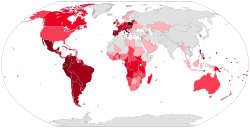Catholic Church in Tunisia
| Part of a series on the |
| Catholic Church by country |
|---|
 |
|
Catholicism portal |
The Catholic Church in Tunisia is part of the worldwide Catholic Church, under the spiritual leadership of the Pope in Rome.
Dioceses
The Catholic church in
- the non-Metropolitan Roman Catholic Archdiocese of Tunis.
There are no Eastern Catholic, pre-diocesan or other exempt jurisdictions in Tunisia.
As this solo-episcopate warrants no national conference, it partakes in the regional Episcopal conference of Northern Africa (French: Conférence Episcopale Régionale du Nord de l’Afrique, C.E.R.N.A.) together with Algeria, Morocco (hosting the headquarters in Rabat), Western Sahara and Libya, the 'Great Maghreb' (Arab region West of Egypt).
There is also an
All defunct jurisdictions are precursors of current (residential or, mostly, titular) sees.[1]
Archdiocese
There are around 30,700 Catholics in this predominantly
Titular sees
- One Metropolitan Carthage[Ancient & modern]
- 343 Episcopal Zica, Zuri.
Tunisian independence
From the late 19th century to after
Facilities
In 2022, Catholics formed the majority (around 24,000 out of 30,000) of Christians in the country.[4] In the past, the Diocese of Tunis operates 12 churches, 9 schools, several libraries, and 2 clinics as well as holding religious services, running a monastery, freely organized cultural activities, and performed charitable work throughout the country.[5] Occasionally, Catholic religious groups held services in private residences or other locations.[5]
Ecumenical outreach
Pope John Paul II visited Tunisia on April 15, 1996, to give support to the Church there and called for a peaceful dialogue between Muslims and Christians across North Africa.[6][7]
Freedom of religion
In 2023, the country was scored 3 out of 4 for religious freedom.[8] In the same year, it was ranked as the 36th worst place in the world to be a Christian.[9]
See also
- Religion in Tunisia
- Category:Churches in Tunisia
- List of Saints from Africa
- Sainte-Croix Church of Tunis, a former church building
References
- ^ GCatholic - data for all sections
- ISBN 978-0-19-922721-1. Retrieved 26 January 2013.
- ^ "Holy See, Tunisia Sign Accord; Church Cedes Considerable Property", The Guardian 17 July 1964
- Bureau of Democracy, Human Rights and Labor
- ^ Bureau of Democracy, Human Rights and Labor (September 14, 2007). This article incorporates text from this source, which is in the public domain.
- ^ William D. Montalbano, Pope Seeks Tolerance in Visit to Tunisia. Los Angeles Times. April 13, 1996.
- ^ William D. Montalbano. Pope Urges Dialogue With Muslims. Los Angeles Times. April 15, 1996. There are an estimated 8.5 million Muslims in Tunisia.
- ^ Freedom House website, retrieved 2023-08-08
- ^ Open Doors website, retrieved 2023-08-08
